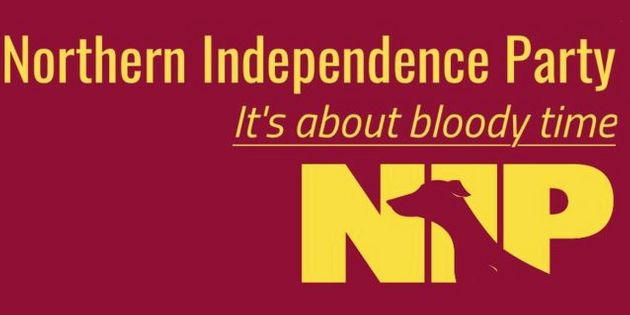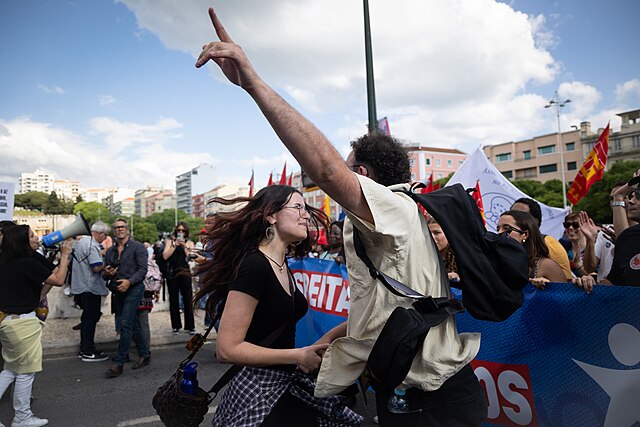Something interesting is happening in the North of England. As Andrew Burgin from Left Unity posted on facebook, “Until last week the Northern Independence Party (NIP) existed solely as a humorous twitter account. In the last couple of days 1000 people have joined it.” Burgin quoted an article by James Matthewson, a “Labour Party communications expert” who argues the following:
“The Northern Independence Party is the best (by which I mean worst) example of the fetishisation of Northern working-class culture by privileged, middle class hard-left ideologues. Only a political party founded by somebody living in Somerset could demonstrate this level of cultural insensitivity and Partridge-like parody. Even now it pains me to write that the party’s logo features the silhouette of a whippet “
The references to Alan Partridge – a spoof sports reporter – and whippets – a dog associated with old men in the North which has been adopted as part of NIP’s logo – show the concerns of the old Establishment which is unable to cope with the fact that its opponents may play by different rules and even use humour. Critics who focus on the whippet logo or the issue of Northern Independence singularly miss the point of what is happening.
It is true that people from the North of England (like myself) have long been disgruntled at the media and political concentration on London, and were the main victims of Margaret Thatcher’s policy of deindustrialisation, which was carried on by Tony Blair. But it’s about much more than this – and many in the South feel similarly disenfranchised. This week also saw a similar electoral challenge to Labour in Luton, where the former chair of the Constituency Labour Party will be standing as a Communist Party candidate.
Why now?
I think that the sudden surge in support for NIP is the result of two related things. The first is the inability of Sir Keir Starmer, Jeremy Corbyn’s successor as Labour leader, to offer an electoral challenge to Boris Johnson’s increasingly dangerous Conservative government. Although the Tories are responsible for over 100,000 Covid deaths and a billion pounds worth of government contracts given to their friends and relatives, Starmer has preferred to open fire on members of his own party,
Writing in the Guardian, the paper which arguably did more than anyone to enable Starmer’s rise, Maya Lothian McLean summarizes Starmer’s record:
“Starmer has upset trade unions with his attack on the party’s left wing, and dissuaded teachers from taking strike action over being forced back into schools. He’s been outflanked by the chancellor, Rishi Sunak, on raising corporation tax, despite an explicit pledge to reverse Tory corporation tax cuts at the top of his leadership manifesto. It’s all very confusing.
Repeated directions to Labour to abstain on controversial legislation, such as the “spy cops” and “torture” bills, haven’t helped clarify Starmer’s mission either, especially for someone lauded as a human rights lawyer. Neither has the alienation of marginalised groups, such as black and Muslim voters, over perceived inaction on racism within the party.
There have been no clear nods to future policies, beyond a leaked memo reporting that a paid consultancy had advised the party to ‘use the [union] flag’ and ‘dress smartly’.”
Between 3rd November 2020 and 16th March, Starmer’s personal approval polls dropped from 45% to 32% while the number of people feeling he was doing a bad job rose from 29% to 45%. Only 44% of Labour voters found he was doing well – a fall of 20% in less than 6 months.
Who can we trust?
Then there are the cases of Liverpool and Hartlepool, both in Northern England. When Liverpool mayor Joe Anderson was accused of bribery and witness intimidation, he was forced to stand down, causing new elections. The Labour shortlist contained 3 women, but the day that ballot papers were supposed to be sent out, Labour suspended voting, telling all 3 that they would not be considered in the re-organised vote. No explanation was given. A candidate more amenable to the London party leadership was selected this week.
Meanwhile, unelected commissioners appointed by Conservative secretary Robert Jenrick have been placed in charge of Liverpool council. This measure has been supported by Keir Starmer. So we now have Tories in charge of Liverpool, although the last time the Conservatives won any election in Liverpool was when Steve Fitzsimmons was elected councillor for Woolton in 1994. Fitzsimmons later defected to Labour.
Shortly after the Liverpool debacle, Hartlepool Labour MP Mike Hill resigned over allegations of sexual harassment. Although Labour fears losing a once safe seat, it imposed a list of possible parliamentary candidates containing just one name – that of Paul Williams, director of a private company profiting from the National Health Service and a defender of the Saudi régime who is also notorious for a Tweet asking “Do you have a favourite Tory MILF”? For those who have missed this unfortunate part of popular culture, a MILF is a “Mother I’d Like to Fuck”, a term who’s offensiveness should be quite clear.
In many parts of Britain, including the old industrial heartlands of Northern England, Johnson’s Tories are hated while Starmer’s Labour is deeply mistrusted. Meanwhile, that other institution of state control – the British police – is proving itself to be just as oppressive as its more notorious US-American counterparts.
Just a couple of weeks ago, a policeman was charged with the kidnap and murder of Sarah Everard. The policeman, who was licensed to carry firearms, had previously been accused of exposing himself on 2 separate occasions. A peaceful vigil of women for Sarah on Clapham Common was violently attacked by his fellow-policemen.
This was not all. A peaceful sit down protest in Bristol against the new draconian Police Bill was also bludgeoned by police. Police claims that officers had suffered broken bones were later found to be a lie to distract attention from their own brutality. Only this week in Manchester, police stripped a female protestor in broad daylight.
Challenge in Hartlepool
This is the background to NIP announcing that they would be standing Thelma Walker at the Hartlepool by-election. Walker is a former Labour MP, who resigned from the Labour Party in November last year, the day after Keir Starmer refused to return the Labour Whip to Jeremy Corbyn. She was also Parliamentary Private Secretary to Corbyn’s former Shadow Chancellor John McDonnell, and is clearly a big deal. And unlike her Labour opponent, Paul Williams, Walker was democratically chosen as a candidate by party members.
All this makes her a highly potent symbol for those appalled at the fact that the man who inspired many people to join Labour is still not allowed to sit as a Labour MP. The Hartlepool election could provide a lightning rod for all those who are outraged by Starmer’s behaviour towards his predecessor as Labour leader.
It is only a few years since hundreds of thousands of mainly young people streamed into Labour, causing it to be the largest political party in Western Europe. This was not just a question of numbers – a large number of people wanted to actively change the world. This was visible at the huge rallies which were inevitably accompanied by the chant “Oh, Jeremy Corbyn!” This built on earlier initiative like the People’s Assembly which mobilised people in their communities against Tory (and Labour) cuts.
This enthusiasm and dynamism has been squandered. Many have left the Labour Party, no longer able to continue making apologies for a party that clearly no longer represents them. Most remain largely isolated and atomised. Many others remain inside the Labour Party but are unable to affect the party’s inexorable drive to the right.
Challenge on the streets
Starmer’s weakness could and should be a fillip to Britain’s activist Left, and indeed to a degree it has been. Movements like the campaigns against colonialist statues to Sisters Uncut, which has mobilised against the Police Bill and institutional sexism have flourished, despite the difficulties affecting protests caused by COVID-19. Corbyn himself has launched the Peace and Justice Project, which aims “to bring people together for social and economic justice, peace, and human rights, in Britain and across the world”.
And yet none of these campaigns has so far been able to provide the political focus that we need to challenge the Hydra heads of Johnson and Starmer. By “political focus”, I do not just mean an electoral challenge, but the ability to inspire the victims of neoliberalism that an alternative is possible.
Unless something earth-shattering happens, it is unlikely that NIP will win the Hartlepool election. To be honest, it is more likely that they will split the “left” vote and let in a Conservative MP. For this reason alone, some on the Left are warning against supporting NIP.
But Labour has no reason to expect that it can count on our votes and we must just sit back and accept everything (following the old Chumbawamba lyric “they break our legs and we say thank you when they offer us crutches”). If an NIP election campaign means that the Tories have a majority of 81 instead of 80 then so be it, as long as it also means that our side sees that Left opposition to Starmer is possible.
The role of the organised left
There is a final actor that I have so far neglected to mention – the organized extra-parliamentary and revolutionary Left. Three of the most important political campaigns in Britain in the last 50 years – the Anti-Nazi League, the campaign against the Poll Tax, and the mass protests against the Gulf War were mass actions initiated by the revolutionary left outside Labour.
In the past 20 years, the extra-parliamentary/revolutionary left has suffered splits and crises and does not necessarily have the same pull as during its heyday. The hundreds and thousands – if not millions – who were disillusioned by what I elsewhere called the Lonesome Martyrdom of Jeremy Corbyn did not flock into existing Left organisations. I find this a shame, but to a degree understandable.
This does not mean that the organised left – and left-wing ideas in general – are now irrelevant, quite the reverse. The outrage at both Johnson’s bumbling incompetence and Starmer’s contempt for democracy means that many people are interested in not just the ideas of our side, but in how we can actively change the world. The current protests are one side of this, but threatened strikes of gas workers, deliveroo riders and even nurses could be even more important.
To give a focus to this resistance, the left needs political representation. Not just – or even primarily – in parliament, but as an organisation which cannot be ignored – like die LINKE in Germany or (despite its recent mistakes and compromises) Podemos in Spain. I don’t believe that NIP will provide this focus, but it could be the midwife, the John the Baptist say, which paves the way towards the regrouping of the left that we all need.
Thelma Walker herself has said that this could be the beginning of the coalition that she hopes will lead to a new Democratic Socialist Party. It is too early to see what sort of impact NIP will have, but we can hope.
As the great men said, we have nothing to lose but our chains. We have a world to win.
Many thanks to Andrew Burgin, Rob Hoveman, Carol McGuigan and Anna Southern for commenting on an earlier version of this article




